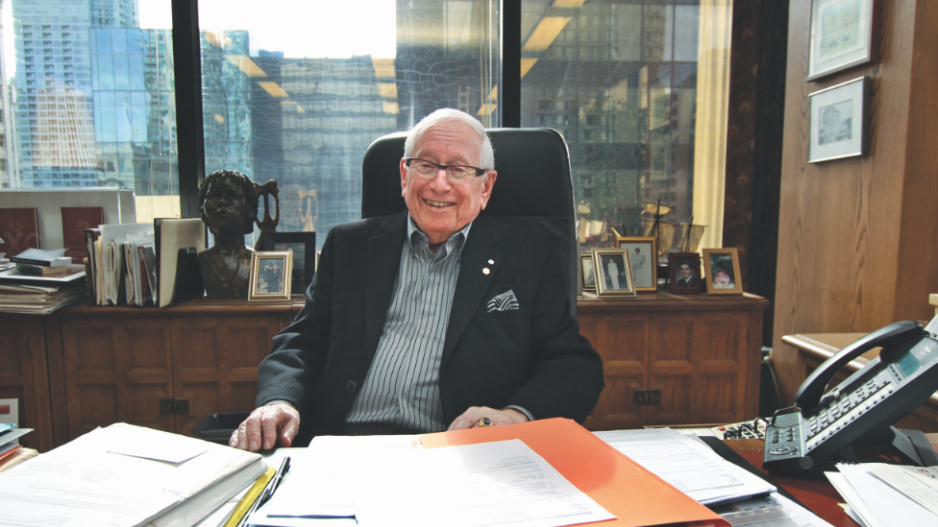He speaks in metaphors.
Sitting in a comfortable chair in front of his desk at his Kingswood Capital Corp. office, company founder and family patriarch Joe Segal regales a visitor by peppering a discussion with vivid images and analogies about how being accessible and valuing open communication helped him achieve success.
Fresh from celebrating his 90th birthday in January, Segal is one of Vancouver’s most successful and respected businessmen, and he is as sharp as ever and quick with a quip.
He owes his physical agility to resistance training in the pool of his Point Grey mansion and his mental quickness to his continuing involvement in business.
One memory he’ll never forget is how he persuaded bankers in 1976 to lend him $50 million so his then-100-store Fields chain could buy the much larger Zellers.
He calls it “a case of the mouse swallowing the elephant,” but it set him on track to make a fortune in the retail sector.
When he doubled Zellers’ sales within three years of buying the company – all without opening any new stores – he explains that it was because he “lifted the Saran Wrap and let the company breathe.”
By that, Segal explains, he means that he let people tell him what was wrong with the company and allowed them to disagree with what were sacred corporate tenets.
“When I arrived on the scene at Zellers, anybody who ever walked by their superior virtually stood at attention,” he said. “It was like I was back in the army.”
Segal implemented a policy of accessibility.
“If the door is open and you listen, you learn,” he said. “If the door is closed, you’re never going to hear anything.”
Segal asked for insight from floor clerks, who would tell him what customers said they liked and what they requested but was out of stock. He then instituted a process whereby customer feedback could be relayed to the person responsible for the store, so the situation could be corrected.
Segal created Kingswood after he sold Zellers to the Hudson’s Bay Co., in 1979, and made enough of a profit to kick-start a career as a real estate developer and dabble in other ventures, such as Collegiate, which he eventually sold and which morphed into what is now FGL Sports.
Kingswood’s recent real estate activity includes buying the tenantless Anvil Centre in New Westminster for $35.5 million, preparing to build a small retail building on Alberni Street in a plaza attached to his Grosvenor Building and partnering with Bosa Properties to buy the Crown Life building at 1500 West Georgia Street for $120 million.
Kingswood is in the early phases of planning to build a residential building in the Crown Life building’s plaza.
Segal’s empire is diversified enough to include companies such as crib-maker Stork Craft Manufacturing Inc., steel shelving manufacturer E-Z-Rect Manufacturing Ltd. and hot water tank maker Allied Engineering Co.
He also has stakes in various public companies.
Large donations, such as the $12 million gift that he and wife Rosalie Segal donated to help build an $82 million mental health treatment facility at Vancouver General Hospital, have built his reputation for philanthropy.
Real estate, however, is now the sector that he is most identified with.
His success in that field comes in part from applying one of the lessons that he learned as a retailer: buy out-of-favour products that have intrinsic value.
Segal’s retail career launched in 1946, when he returned from military service in Europe and opened an army surplus store.
“The only thing I could buy with the little amount of money I had was what nobody else wanted,” he said, referring to the army supplies.
“If anybody else wanted the goods, I couldn’t compete [because they would be too expensive].”
Buying the tenantless Anvil Centre, which is nearly complete, follows a similar principle.
The 14-storey tower is vacant largely because its location on Columbia Street near Eighth Avenue is not considered prime, Segal said.
“If the Anvil building was sitting on West Georgia Street, it would be leased in a minute,” he said. “I will be disappointed if that building isn’t leased in the next six to eight months.”
Past success turning around undesirable properties included a transaction in the mid-1990s to buy a tenantless 350,000-square-foot property at 611 Alexander Street, near the Port of Vancouver.
The building is so long that, were it stood upright, it would be as tall as a 35-storey tower.
Segal filled the building and said that it has never since had a vacancy of any significance.
Luck has clearly also played a role in his fortune.
All classes of Metro Vancouver real estate have risen substantially during the last several decades, when Segal was most active in the market.
Still, his strategy of buying properties with unrealized value is one that he believes will help him weather any potential future downturn.
After all, a correction in the Vancouver real estate market, at some point, is inevitable, “but not across the board,” he said. “There will be pockets that take a bit of an impact. When things are good, everybody chases what’s hot. You’ve got to be able to survive through thick and thin, through adversity or prosperity.”•




